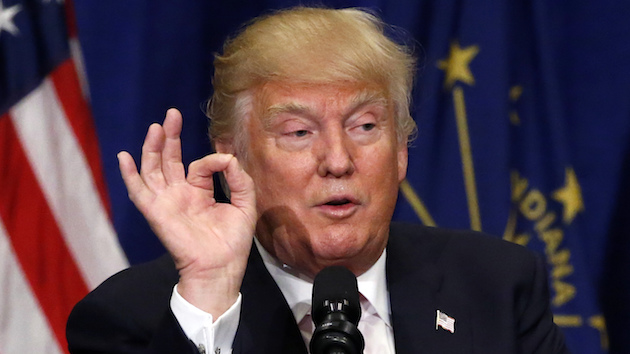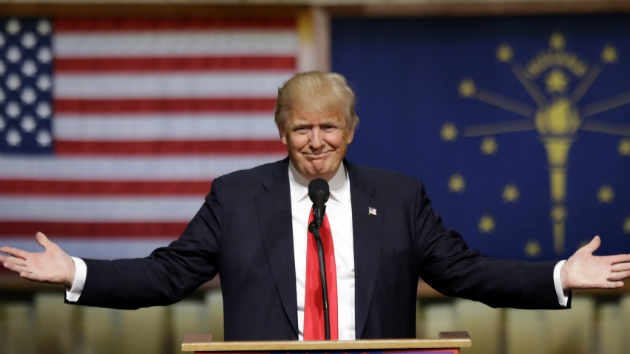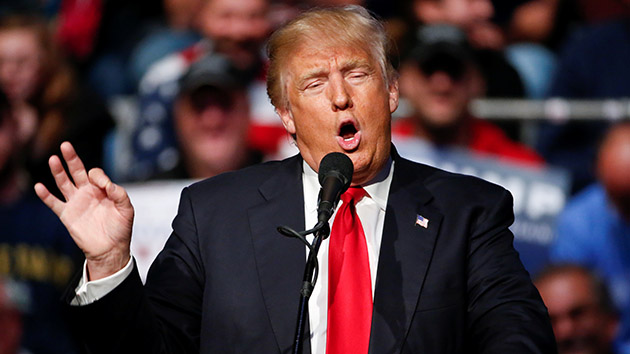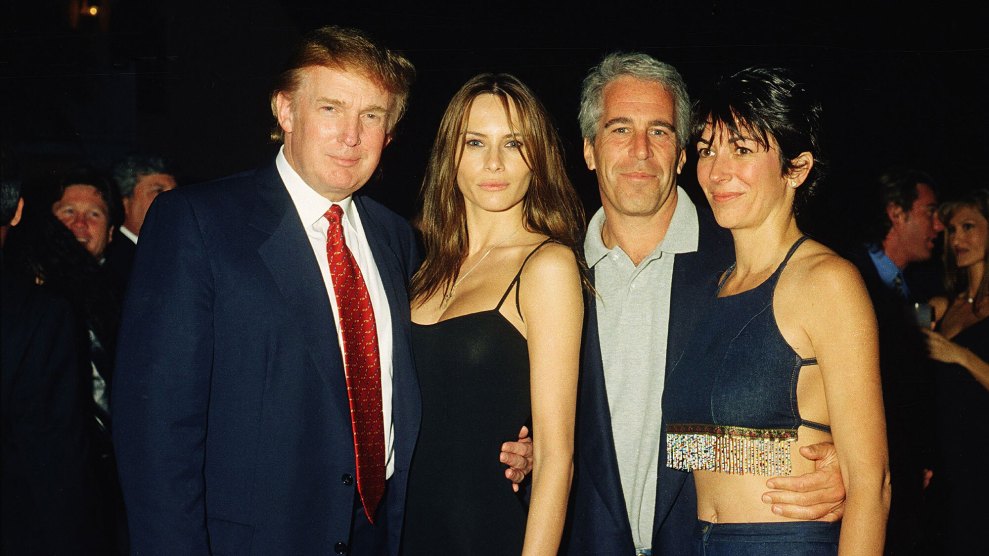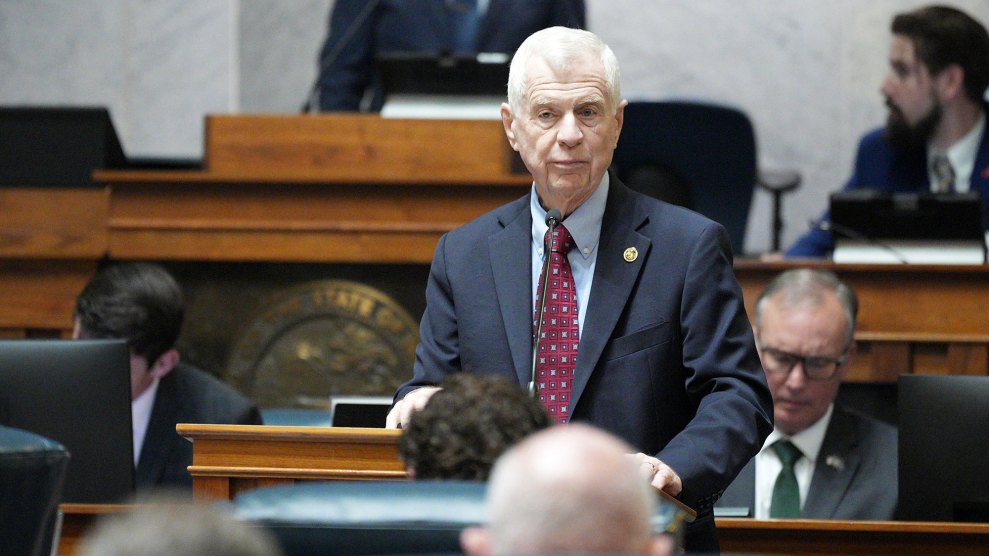
Libertarian presidential candidate John McAfee Saul Martinez/EFE/Zuma
An hour before the Libertarian Party presidential debate in New York City on Saturday, the cybersecurity guru John McAfee, one of the candidates, was smoking a cigarette outside the venue, a Ukrainian restaurant in the East Village, and explaining how he could win in November. “I would dance circles around Trump,” McAfee said. “Trump likes to sling mud. It’s impossible to sling mud at me—I sling it at myself first.”
That is a gentle way of putting it. Four years ago, McAfee was deported to the United States from Guatemala after escaping from Belize, where authorities declared him a person of interest in the death of his American neighbor. McAfee claims the Belizean government set him up after torturing him and shooting his dog, perhaps with the approval of Hillary Clinton’s State Department. In February, the FBI reportedly interviewed his ex-girlfriend about the murder. But he does not think what happened in Belize should disqualify him. “I think it makes me eminently viable—Hillary Clinton is being investigated by the FBI and she’s running,” he said.
McAfee, who is 70 but has a goatee and frosted tips that give him the profile of an over-the-hill Backstreet Boy, was shadowed by a gaggle of photographers and filmmakers as he loitered on the sidewalk. He told a Spike TV camerawoman that she is “sexy enough to turn a gay man straight.” He told the director Billy Corben, who is making a six-part docuseries on McAfee, that his project was a disaster and that he would wind up running a shoe store. At one point, McAfee approached a camera, held his face an inch from the lens, and flicked his tongue.
Even by the freewheeling standards of the Libertarian Party, McAfee is an unusual candidate. But he has also joined the party at an unusual moment in time. After three decades on the fringe, the one-time party of Russell Means and David Koch has found a rare opening thanks to Donald Trump, the presumptive GOP nominee. A quarter of anti-Trump Republicans say they would consider voting for a third-party candidate, and with no white knight—no Michael Bloomberg, Paul Ryan, or General James Mattis—preparing for an independent run, there may be nowhere else to turn but the Libertarian Party.
“When the media talks right now about ‘third party,’ what they’re not acknowledging is that we are the third party,” said former New Mexico Republican Gov. Gary Johnson, the party’s 2012 presidential nominee who is running to be its standard-bearer once again. “The Libertarian nominee will be the only third-party nominee on the ballot in all 50 states.”
This could be a historic year for the gun-loving, big-government-bashing, pot-smoking third wheel of American politics—if the Libertarian Party can just keep it together.
McAfee may draw most of the cameras, but his path to the nomination is a difficult one. There are 17 Libertarians running for president, four of whom participated in the debate at the New York Libertarian Party convention, a modest after-lunch affair in front of a hundred or so attendees in the restaurant’s wood-paneled back room. The front-runner for the nomination, which will be decided by delegates at the party’s convention in Orlando later this month, is Johnson, who won a record 1.3 million votes under the Libertarian Party’s banner four years ago. Between presidential campaigns, Johnson was the CEO of a Nevada-based marijuana company that specializes in candy and creams. If he loses in November, his greatest professional legacy will probably be the creation of a not-yet-street-legal kind of lozenge called “Hi,” which he has predicted will be a household name 200 years from now.
Johnson is anti-war, socially liberal, and fiscally conservative, but rather than laying out his positions, he’d rather talk about a website he found, isidewith.com, which purports to match your political views with the corresponding candidate. He likes to tell people that he took the quiz and agreed with Gary Johnson 99 percent of the time. More important—for the purposes of a candidate and a party that voters know little about—the quiz shows that a lot of people agree with him at least some of the time, including Bernie Sanders supporters. In a year in which a large portion of voters in both parties don’t like their first choice, Johnson wants to be their second.
“Trump and Hillary alienate most voters,” Johnson told me before the debate, as diners nearby munched on pierogies and stuffed cabbage. “They’re the two most polarizing figures in politics today. If there were ever an opening for a Libertarian candidate, it’s now.” His literature asks voters simply to “be Libertarian for one election.” (The 50-state goal is aspirational—the party is currently on the ballot in 32 states, plus the District of Columbia.)
On Tuesday night, a few minutes after Ted Cruz dropped out of the GOP race, Johnson made this pitch more explicit, releasing a web video addressed specifically to “Never Trump” Republicans, in which he promised to fight for “small government and conservative values.” Johnson, whose style of speaking sometimes resembles that of an incredulous stoner, was a bit of an outlier as a Republican. But now the situation has flipped. The essence of his candidacy is that he’s normal enough to convince Republicans to do something they’d otherwise consider crazy—vote third party.
You could see how sharing the debate stage with someone who believes that hit men from the Sinaloa cartel are leaving cream cheese wrappers on his property—as McAfee told a reporter from Men’s Journal—would throw a wrench into his plan to make the Libertarian Party look mainstream. But Johnson is staying positive. “It’s something that I can’t concern myself with,” he said, referring to his eccentric rival. And Johnson, for all his experience in government, is still an eccentric himself. When Fox Business Network’s John Stossel asked McAfee about his troubles in Belize at another debate last month, Johnson walked over from his podium and kissed McAfee on the cheek.
The love does not go both ways. McAfee’s campaign is built on the Trumpian promise of a celebrity outsider shaking up the political system by earning tons of free media, saying some audacious things (he offered to decrypt the San Bernardino shooter’s phone if the FBI would leave Apple alone), and appealing to a silent majority of fed-up voters. McAfee only recently joined the Libertarian Party, but he has already threatened to leave it if Johnson wins. “If Johnson does get the nomination then it is clear that I misjudged the party,” he wrote last month. “Nothing and no one will change my mind on this.” He has refused to elaborate on why he thinks this. But in a Facebook post, Judd Weiss, McAfee’s running mate—yes, McAfee has already picked one—laid out McAfee’s rationale.
According to Weiss, a photographer and longtime Libertarian activist, McAfee believes Johnson attempted to pay McAfee’s staffers to switch sides. Weiss also alleged that pro-Johnson forces had secretly bought out all the hotel rooms at the Orlando hotel where the party’s nominating convention will take place. (The Johnson campaign has denied all of this.) Weiss, who is not threatening to quit the party, accused Johnson of developing bad habits while working in the “cesspool of scheming viciousness” of Republican politics.
“John clearly isn’t one to keep silent and smile politely,” Weiss wrote. “My god, you really don’t want to fuck with him. Seriously.”
By the standards of the candidates’ recent feudING, the New York debate was comparatively mellow, borrowing its tone from the event’s opening act, an acoustic performance from folk-singer Tatiana Moroz, the first musician with her own digital crypto-currency, Tatianacoin.
McAfee does not appear to relish the theater of running for president. When moderator Todd Seavey invited him to make an opening statement, he told attendees that he “slept through” his debate prep but would “hopefully” have something better to say during closing statements. He stared up at the chandelier when his opponents talked and he dragged his hands slowly over his face, as if he hadn’t slept in a while. Earlier, when Vermin Supreme, a perennial presidential candidate and performance artist famous for wearing a black rubber boot on his head, approached McAfee and gushed that together they will “turn up the brightness of the future!” McAfee replied, “anything to get me through the boring shit I’ve been going through for four months.”
McAfee and Johnson shared the stage with two other candidates, Darryl Perry and Austin Petersen. Perry is a Free State project activist from New Hampshire whose campaign conducts business exclusively in Bitcoin and precious metals. (His cash on hand is two half-gram silver cards, four silver quarters, seven silver dimes, 1.75 ounces of silver, and 0.45427586 Bitcoins). He recently picked up the endorsement of the Libertarian Party Sex Caucus. His platform states that the US government “as it exists today, should be abolished,” which would render moot any questions about his lack of experience. (His biography mentions his work at a college radio station.) At the debate, he called the federal government “the world’s largest terrorist organization,” and he identified himself, in contrast to Johnson, as a member of the “libertarian wing of the Libertarian Party.”
Petersen is a suit-and-tie libertarian who previously worked for FreedomWorks and Fox News host Andrew Napolitano. He raised money for Ron Paul’s presidential campaign and name-drops Republican elected officials he considers allies, such as Michigan Rep. Justin Amash and Kentucky Rep. Thomas Massie. Boyish and a little overeager, Petersen refers to himself as the “freedom ninja” and contends that the party needs a fresh face who can “bring along those Never Trump conservatives who are just dying to vote for a pro-life libertarian.” He was also the only candidate who suggested that McAfee’s past might hurt the party in November, but in the same breath he called McAfee a “badass” and said McAfee had offered to drop acid with him. (McAfee said this was a joke and that he hasn’t used drugs in 35 years.)
Trump hovered over everything. Asked about immigration, Johnson cited his work as a border state governor and called Trump’s proposal for a massive border wall ludicrous. McAfee noted that he was an immigrant, of sorts, having been born overseas to an American serviceman. (As a follow-up, the moderator asked him if that made him ineligible to be president, to which McAfee said, “Under the laws of this country, I could be qualified or disqualified for almost anything.”) Johnson hammered Trump on economic protectionism, on civil liberties, and on abortion.
Petersen called Trump a gift to the Libertarians—”we are now seeing massive immigration into our open borders of our party”—but he contended that there was something worth emulating about the celebrity billionaire, in style if not substance. “He’s got the showmanship and the qualities and performance that we’re gonna need to take this message to the masses,” he said. “Not this same sort of egghead intellectualism that we have.”
This is, in part, the appeal of McAfee; he’s a candidate for people who don’t like the old way of doing things. Derrick Michael Reid, a long-shot candidate who participated in a JV debate that preceded the main event, put it to McAfee as they huddled outside the restaurant. “If Johnson gets nominated, the country just goes through a big yawn—’oh, the goofy governor,’ and that’s it,” he said. “They nominate you or me, they go viral.” At the very least, it’ll get them on Spike TV.
But there is a lesson in Trump for a party that has struggled for decades to get anyone’s attention. (All the candidates agreed that their path to success is predicated on doing something Johnson didn’t do in 2012—qualify for a presidential debate.) Trump, who long ago flirted with a run for the Reform Party nomination, is not so different from what the Libertarians aspire to be. He is someone whose policies don’t fit neatly inside the two-party framework and who has managed, with minimal assistance from establishment organs, to force his way into the conversation and disrupt the whole damn thing. This is the dream of all political outsiders—that one day something cataclysmic will happen to convince voters that what they really believe in is not what the status quo offers. Unfortunately for the Libertarians, there has already been a transformative outsider candidate in 2016. And he’s taken over the GOP.

